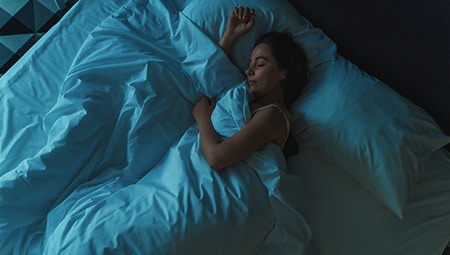
by Dr. Robert Rosenberg, Medical Adviser to SoClean
Sleeping peacefully for seven or eight uninterrupted hours can be glorious. But a wide range of factors can disrupt sleep, and the older you are, the more likely you are to suffer from one or more of them. Here are 10 of the most common culprits: of fragmented, interrupted, restless sleep.
How to Fix Common Sleep Problems
Work stress. With fewer boundaries than ever between work and home life, job anxieties often disturb sleep. People tend to work late and use their computers in the bedroom, not giving their minds time to settle and disconnect. So even if they fall asleep, they’ll wake up in the night with their sympathetic nervous system revving, which triggers their fight-or-flight response and makes it impossible to go back to sleep. The solution is to knock off work at least 60 to 90 minutes before bedtime, and avoid using your computer in the bedroom. You can also try “constructive worrying.”1 Before you wrap up work for the day, write down the main issues concerning you and brainstorm some possible solutions. Then tuck that list away and don’t think about it again until the morning.
Your sleep environment. A bad mattress, a room that’s too warm or cold, noise, or too much ambient light can all mess with sound sleep. If your mattress is more than 8 years old, or is uncomfortable, replace it. Most people sleep best with a room temperature between 60 and 68 degrees.2 If you tend to wake up hot, use a fan and don’t overdo the blankets. Make sure your bedroom is dark and quiet, and consider blackout shades and earplugs if your neighborhood is bright or noisy.
Alcohol. Although alcohol can help you fall asleep initially, people get sucked into using it as a sleep aid, and that backfires. After the effect wears off, a minor withdrawal occurs, waking you up. That triggers your sympathetic nervous system and, in turn, your fight-or-flight response. To avoid that, people often start drinking more and more before bed, which is unhealthy and potentially dangerous. It’s much better to refrain from alcohol at least three hours before bedtime.
Caffeine. The effects of caffeine linger much longer than many people realize. Its half-life is around five hours,3 so if you consume it eight hours before bedtime, approximately a quarter may still be present when you lie down. Although caffeine doesn’t affect all people the same way, it tends to block a brain chemical called adenosine that builds up during the day and helps you sleep at night. Additionally, the older you are, the longer it may take your body to metabolize caffeine and the more likely it is to upset your sleep.
Liquids. A full bladder is a common sleep disruption, so limit liquids late in the day. If you’re still waking up three or more times a night to urinate, see a doctor. You may have a urinary tract infection or even a kidney issue.
Depression and anxiety. A classic depression symptom is early-morning awakenings. Unfortunately, the lack of sleep this causes worsens the depression; depression, in turn, hampers sleep, creating a downward spiral. Anxiety can foster a similar spiral, in which worry keeps you awake and then you worry more about your lack of sleep. It might help to get a referral to a therapist who can help you treat your depression or anxiety. Also, journaling or meditation may help calm your mind.
Primary insomnia. This is an inability to sleep that can’t be attributed to any specific cause. People with primary insomnia wake up frequently during the night and struggle to fall back asleep. The solution: cognitive behavioral therapy—or, in lay terms, changing your routines. Start by turning off your devices an hour or two before bed. If you wake up during the night, resist the temptation to look at them. Don’t look at the clock, either. If you’re still awake after 15 or 20 minutes, get up and do a quiet activity like reading—real books, not screens—in another room. Once you get really sleepy, go back to your bed. You’ll soon start to break the negative associations with trying to sleep in your bedroom.
Restless legs syndrome (RLS). As its name implies, Restless Leg Syndrome’s main symptom is a strong urge to move your legs, usually because of a tingling, burning, itching, throbbing or cramping sensation. RLS occurs primarily at night, after you’ve been still for a while. It can come on at any age, but it’s more common as people get older; roughly 10 percent of people over 50 suffer4 from RLS, and it’s more common in women than men. Prescription medications can ease the symptoms, leading to better sleep. But don’t look to over-the-counter sleep aids—they can actually make the problem worse over time.
Other sleep disorders. Conditions such as nocturnal bruxism (teeth grinding or clenching) and periodic limb movement disorder (involuntary jerking of the arms or legs) can also interrupt your sleep. See a doctor for remedies such as mouth guards or medication.
A partner who can’t sleep. Sometimes the problem can be pinned on the disrupted sleep of the person (or pet) who shares your room. Encourage them to try the remedies listed here or—especially in the case of a pet—find them a new bed!
To continue learning about sleep, read our posts on alarm clock tips for better sleep and the virus-fighting power of adequate sleep.
Sources:
- “Cure Insomnia Using Constructive Worry,” Cognitive Behavioral Therapy Los Angeles, accessed October 2020.
- “The Claim: Cold Temperatures Improve Sleep,” by Anahad O’Connor, The New York Times, August 2009.
- “How Long Does Caffeine Stay in Your System?” by Kristeen Cherney, Healthline, November 2018.
- “Quieting Restless Leg Syndrome: Caregiver Tips,” Benjamin Rose Institute on Aging, accessed October 2020.




